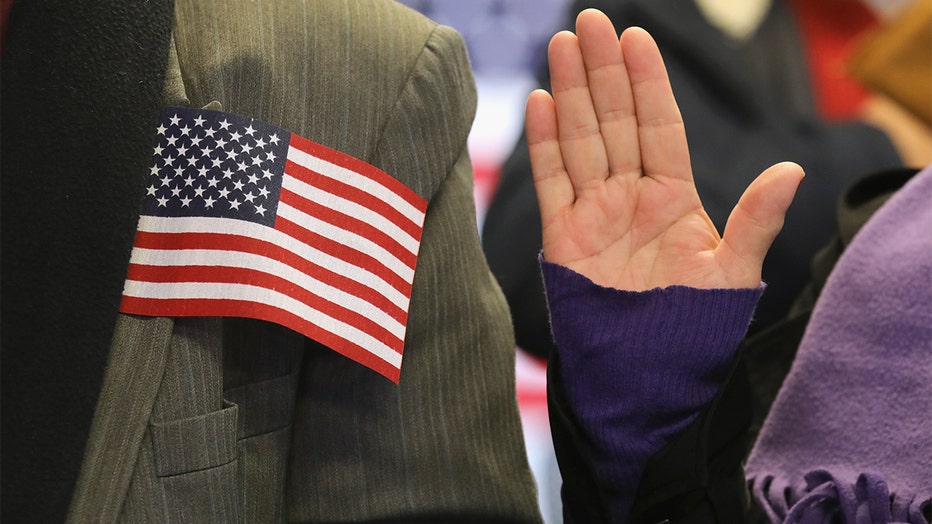Policy on automatic citizenship for children born abroad to US military members changed

Policy on automatic citizenship for children born abroad to US military members changed
The U.S. Citizenship and Immigration Services (USCIS) issued a new policy alert that rescinded previous guidance.
WASHINGTON - The children of some overseas U.S. military members and government employees will no longer receive automatic citizenship, the Trump administration said Wednesday in a policy alert.
The U.S. Citizenship and Immigration Services (USCIS) issued a new policy alert that rescinded previous guidance stating that children of U.S. military members and government officials abroad are considered “residing in the United States” and given automatic citizenship under the Immigration and Nationality Act (INA), section 320.
USCIS spokesperson Meredith Parker further explained the new policy to Task & Purpose, a military and veterans news outlet.
"The policy change explains that we will not consider children who live abroad with their parents to be residing in the United States even if their parents are U.S. government employees or U.S. service members stationed outside of the United States, and as a result, these children will no longer be considered to have acquired citizenship automatically," Parker said.

FILE: Immigrants take the oath of citizenship to the United States at a naturalization service on January 22, 2018 in Newark, New Jersey. Although much of the federal government was shut down Monday morning, the U.S. and Citizenship and Immigration S
USCIS said its new rule would affect three categories of people: children of non-U.S. citizens adopted by U.S. citizen government employees or service members; children of non-U.S. citizen government employees or service members who were naturalized after the child's birth; and children of U.S. citizens who do not meet residency requirements, according to the Hill.
With the new policy guidance, the children now have to fulfill a residency requirement in which they have to physically live on U.S. soil, according to the Hill. Living abroad with U.S. citizen parents will no longer fulfill the residency requirement, the report said.
Instead, the policy said that “U.S. citizen parents who are residing outside the U.S. with children who are not U.S. citizens should apply for U.S. citizenship on behalf of their children under INA 322, and must complete the process before the child’s 18th birthday.”
The child of a member of the U.S. armed forces who is accompanying his or her parent abroad on official orders may be eligible to complete all aspects of the naturalization proceedings abroad, which includes interviews, filings, oaths, ceremonies, or other proceedings relating to naturalization, the policy said.
The policy said prior USCIS guidance is “in conflict” with several provisions of the INA, which includes the definition of “residence.”
“Considering children who are living outside of the United States to be ‘residing in the United States’ conflicts with the definition of ‘residence’ at INA 101(a)(33), which defines ‘residence’ as a person’s ‘principal, actual dwelling place in fact,’” the policy said.
The prior guideline also “resulted in confusion” as to the date a child acquired U.S. citizenship, the new policy said.
If a U.S. government employee or armed forces member stationed outside of the U.S. is a parent who used Form N-600K, it would result in a naturalization proceeding under INA 322. If the parent used Form N-600, it would result in automatic citizenship under INA 320.
Previously, the policy said children of U.S. government employees and members of the U.S. armed forces who were employed or stationed outside of the U.S. should be considered to be both “residing in the United States” for purposes of INA 320 and “residing outside of the United States” for purposes of INA 322.
Under INA 320, children who acquire U.S. citizenship automatically are citizens as of the date on which they meet all eligibility criteria, the policy said. But children who seek naturalization under INA 322 become citizens upon taking and subscribing to the oath of allegiance, or upon approval of the application if the oath is waived.
Under USCIS’ prior guidance, a child of a U.S. government employee or armed forces member who was stationed outside of the U.S. could meet all of the eligibility criteria for acquiring citizenship under INA 320 while residing outside of the U.S., but the child could still also seek to naturalize under INA 322, the new policy said, adding that “In such a case, the date on which the child became a citizen would have been unclear.”
USCIS Acting Director Ken Cuccinelli tweeted a statement about the new policy alert, saying “some people are freaking out over nothing.”
“The policy manual update today does not affect who is born a U.S. citizen, period. It only affects children who were born outside the US and were not US citizens. This does NOT impact birthright citizenship,” he tweeted. “The policy update doesn't deny citizenship to the children of US gov employees or members of the military born abroad. This policy aligns USCIS’ process with the Department of State’s procedures for these children - that's it. Period. Background in next tweet...”
“US laws allow children to acquire US citizenship other than through birth in the US. Children born outside of the US to a US citizen parent or parents may be US citizens at birth under INA 301 or 309, or before age 18 through their US citizen parent(s) under INA 320,” Cuccinelli continued in a third tweet.
Earlier in the day, he tweeted, “...the highly technical policy manual used by career employees here as a reference was updated today to conform USCIS practices with the Dept. of State - that's it. But some people are freaking out over nothing.”
The new guideline, which will be effective Oct. 29, 2019, nonetheless drew swift backlash from Democratic lawmakers, the Hill reported.
“This move by the administration will make it harder for Americans serving our country overseas to have families,” Rep. Val Demings, D-Fla, told the outlet. “This also appears to be an initial step toward ending birthright citizenship, something which the president has threatened to do—and which would be unconstitutional."
This story was reported from Los Angeles.

